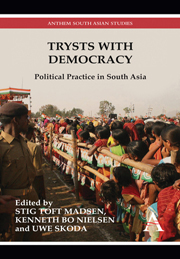Book contents
- Frontmatter
- Contents
- List of Tables
- List of Abbreviations
- Glossary
- Map of South Asia
- Acknowledgements
- 1 Introduction
- Part One Theoretical Issues
- Part Two India
- 4 Ajit Singh S/O Charan Singh
- 5 A Princely Politician in an Indigenised Democracy: A Raja and his Electoral Situation in Rural Orissa 2004
- 6 A Political Breakthrough for Irrigation Development: The Congress Assembly Campaign in Andhra Pradesh in 2003–2004
- 7 Congress Factionalism Revisited: West Bengal
- Part Three Beyond India
- About the Editors
- About the Contributors
4 - Ajit Singh S/O Charan Singh
from Part Two - India
Published online by Cambridge University Press: 05 March 2012
- Frontmatter
- Contents
- List of Tables
- List of Abbreviations
- Glossary
- Map of South Asia
- Acknowledgements
- 1 Introduction
- Part One Theoretical Issues
- Part Two India
- 4 Ajit Singh S/O Charan Singh
- 5 A Princely Politician in an Indigenised Democracy: A Raja and his Electoral Situation in Rural Orissa 2004
- 6 A Political Breakthrough for Irrigation Development: The Congress Assembly Campaign in Andhra Pradesh in 2003–2004
- 7 Congress Factionalism Revisited: West Bengal
- Part Three Beyond India
- About the Editors
- About the Contributors
Summary
This chapter portrays the Indian politician Chaudhary Ajit Singh. Three times a minister of cabinet rank, Ajit Singh is the founder of the Rashtriya Lok Dal (RLD), a party which won five seats in the 2009 Lok Sabha elections after receiving about 1.8 million votes. Ajit Singh is the son of – s/o – Chaudhary Charan Singh who in 1979 briefly rose to become the Prime Minister of India. The political base of both father and son lies in the irrigated farmlands in and around the Baghpat parliamentary constituency in Western Uttar Pradesh (UP), an area dominated by the Jat caste to which the family also belongs. The Jats (as well as some other castes in the area) nurture certain egalitarian values such as clan equality (Madsen 1991), which do not easily allow a headman to exercise uncontested ‘monarchical’ power over his castefellows. Power is typically hotly contested and villages are often divided into warring factions of roughly equal strength. The area is also known for the absence of landlordism. It was Charan Singh himself who was instrumental in abolishing the landlordism which concentrated economic and political power in a few families. Yet, Charan Singh and Ajit Singh have succeeded in mustering sufficient support from Jats and from others to be repeatedly elected. Charan Singh first stood for provincial elections in Baghpat in 1937. After he left provincial politics in the mid-1960, he won the Baghpat parliamentary seat in 1977, 1980, and 1984.
- Type
- Chapter
- Information
- Trysts with DemocracyPolitical Practice in South Asia, pp. 73 - 102Publisher: Anthem PressPrint publication year: 2011
- 19
- Cited by



